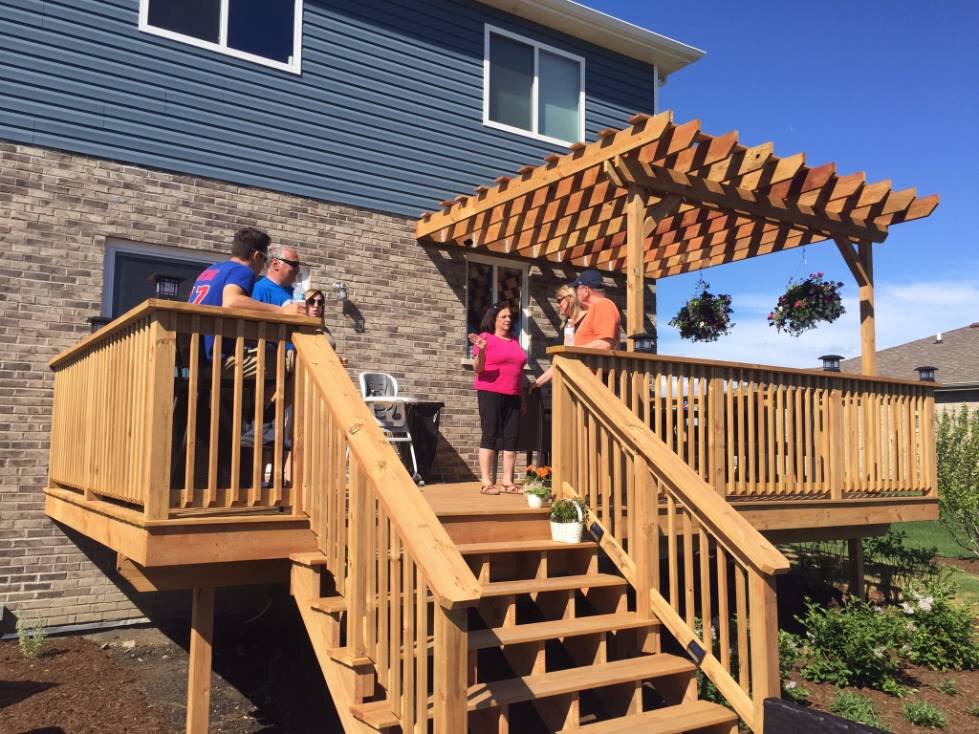All-Season Decking Materials: Choose the Best for Your Home

Creating an all-season deck means selecting materials that can withstand various weather conditions while maintaining beauty and functionality. The right decking material enhances your outdoor space and ensures long-lasting durability. Here’s a look at the best options for all-season decking materials, along with their benefits and considerations.
1. Composite Decking
Overview
Composite decking is a popular choice for homeowners seeking a low-maintenance, durable solution. Made from a blend of wood fibers and recycled plastic, it offers the aesthetic appeal of natural wood without the upkeep.
Benefits
- Durability: Resistant to fading, staining, and weathering, making it perfect for all seasons.
- Low Maintenance: Requires minimal upkeep compared to traditional wood; just occasional cleaning is needed.
- Eco-Friendly: Often made from recycled materials, promoting sustainability.
Considerations
- Initial Cost: Typically higher upfront costs compared to some traditional materials.
- Heat Retention: Can become hot in direct sunlight, so consider lighter colors for warmer climates.
2. PVC Decking
Overview
PVC decking is a synthetic material known for its exceptional weather resistance and durability. It’s entirely plastic, offering a completely waterproof surface.
Benefits
- Waterproof: Impervious to moisture, preventing mold and mildew growth.
- Fade and Stain Resistant: Maintains its vibrant color over time without extensive maintenance.
- Variety of Styles: Available in various colors and textures, mimicking the look of wood or stone.
Considerations
- Limited Natural Look: Some homeowners may find all-season deck the authentic appearance of natural wood.
- Cost: Generally falls in a similar price range to composite decking, but can vary.
3. Natural Wood
Overview
Natural wood decks offer timeless beauty and charm. Hardwoods like cedar, redwood, and mahogany are popular choices for their aesthetic appeal.
Benefits
- Aesthetic Appeal: Natural wood provides a warm, classic look that many homeowners desire.
- Customizable: Can be stained or painted in various colors to match your home’s style.
Considerations
- Maintenance: Requires regular sealing and staining to protect against moisture, rot, and UV damage.
- Durability: While some hardwoods are durable, they may not last as long as composite or PVC options without proper care.
4. Aluminum Decking
Overview
Aluminum decking is an innovative, lightweight material that offers exceptional durability and resistance to the elements.
Benefits
- Weather Resistant: Completely immune to rot, warping, and insect damage, ideal for all seasons.
- Low Maintenance: Requires very little upkeep, with occasional cleaning needed.
- Fire Resistant: Safe for areas prone to wildfires or extreme heat.
Considerations
- Cost: Typically one of the more expensive decking materials on the market.
- Heat Conductivity: Can get hot underfoot in direct sunlight, so consider shaded areas or lighter colors.
5. Bamboo Decking
Overview
Bamboo decking is an eco-friendly alternative that combines sustainability with durability. It’s becoming increasingly popular for modern outdoor spaces.
Benefits
- Sustainable: Bamboo is a rapidly renewable resource, making it an excellent choice for environmentally conscious homeowners.
- Strong and Durable: High-quality bamboo decking is incredibly strong, resistant to weathering and decay.
Considerations
- Availability: May be harder to find compared to traditional decking materials.
- Cost: Prices can vary, and high-quality options may be more expensive than composite alternatives.
6. Treated Wood
Overview
Treated wood is a popular choice for decking due to its affordability and durability. It’s chemically treated to resist rot and insects.
Benefits
- Cost-Effective: Generally one of the most affordable decking materials available.
- Strong and Reliable: Offers solid performance when properly maintained.
Considerations
- Maintenance Required: Requires regular sealing and staining to extend its lifespan.
- Appearance: Can warp or crack over time if not cared for properly, affecting its aesthetic appeal.
Making Your Decision
When choosing the best all-season decking material for your home, consider the following factors:
- Climate: Think about the weather conditions in your area. If you experience heavy rain or snow, opt for moisture-resistant materials like composite or PVC.
- Maintenance: Consider how much time and effort you’re willing to invest in maintaining your deck. Low-maintenance options like composite or aluminum may be best for busy lifestyles.
- Budget: Determine your budget for both initial costs and long-term maintenance. Some materials may have higher upfront costs but lower maintenance expenses over time.
- Aesthetic Preferences: Choose a material that complements your home’s style and your personal aesthetic preferences.
Conclusion
Investing in an all-season deck is a fantastic way to enhance your outdoor living space. By selecting the right materials, you’ll ensure your deck remains beautiful and functional throughout the year. Whether you choose composite, PVC, natural wood, aluminum, bamboo, or treated wood, each option has its unique benefits. Consider your climate, maintenance preferences, and budget to find the perfect decking material for your home. Embrace every season with a deck that invites you to enjoy the outdoors










